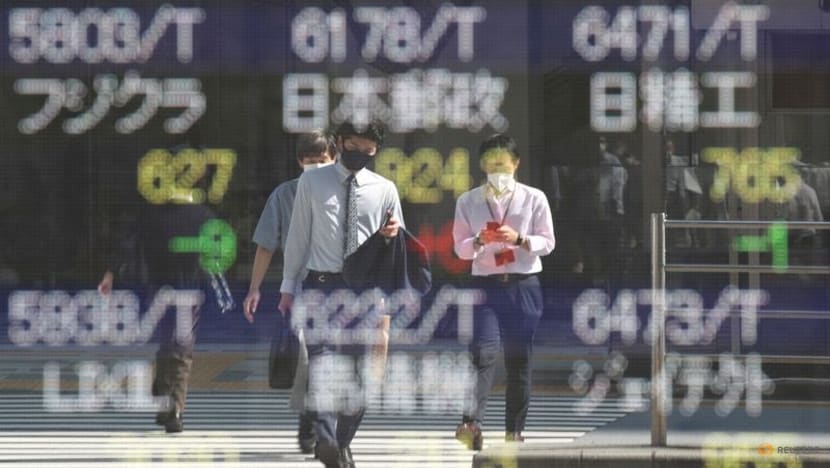Asian shares advance, dollar soft as markets decide Omicron fallout limited

People wearing protective masks, amid the COVID-19 outbreak, are reflected on an electronic board displaying Japan's stock prices outside a brokerage in Tokyo, Japan, Oct 5, 2021. (File photo: Reuters/Kim Kyung-Hoon)
HONG KONG: A global share rally continued in early Asian trading on Thursday (Dec 23) and the safe haven dollar was on the back foot as markets took cheer from positive signs about the impact of the omicron variant of COVID-19 and US economic data.
Japan's Nikkei gained 0.3 per cent and MSCI's broadest index of Asia-Pacific shares outside Japan rose 0.6 per cent, a third successive session of gains after taking a jolt on Monday when fears about the new strain of coronavirus gripped markets and pushed investors to safe haven assets.
"The unpredictable path of the pandemic and its related impacts on growth and inflation continue to dominate investor risk appetite," said David Chao, global market strategist Asia Pacific at Invesco.
"The recent health data from the UK and other places around the world indicate that the worst case is unlikely: Even though transmission rates are reportedly higher, this variant seems less virulent and less prone to cause serious illnesses or death."
The risk of needing to stay in hospital for patients with the Omicron variant of COVID-19 is 40 per cent to 45 per cent lower than for patients with the Delta variant, according to research by London's Imperial College published on Wednesday.
Overnight the Dow Jones Industrial Average rose 0.74 per cent, the S&P 500 gained 1.02 per cent, and the Nasdaq Composite added 1.18 per cent, after data showed US consumer confidence improved further in December, and the White House said it was resuming talks on a massive social spending and climate change bill with holdout senator Joe Manchin.
However, while markets on both sides of the Pacific have gained this week, MSCI's broad Asian benchmark's gains began from Monday's year low, while US benchmarks are in sight of last month's record highs.
Strong economic growth in the United States and jitters sparked by sweeping regulatory changes in China earlier this year which roiled shares in industries from technology, to property have driven investment away from Asia.
Hong Kong's Hang Seng Index has been hard hit, falling 15 per cent in 2021, which would be its worst year since 2011.
On Thursday, the benchmark rose 0.45 per cent, though index constituent JD.com's shares dropped as much as 9 per cent after the ecommerce company's largest shareholder Tencent said it would give most of its US$16.4 billion stake to its own shareholders as a dividend.
In currency markets, in line with the "risk on" mood the dollar index was at 96.042, not far from the overnight low of 96.020, touched for the first time since Dec 17.
Recent losses have been fairly broad-based; the euro has gained for the last four sessions, and the Australian dollar - often seen as proxy for risk appetite - is up 1.1 per cent on the week.
The benchmark 10-year yield was last at 1.4145 per cent, comfortably in the middle of its recent range.
Oil prices also rose, again in line with optimism about the state of the global economy, also helped by a larger-than-expected drawdown in US inventories Wednesday.
Brent crude futures rose 0.3 per cent to US$75.53 a barrel. US West Texas Intermediate (WTI) crude futures rose 0.38 per cent to US$73.04.
Spot gold was steady at US$1,804 an ounce, above the symbolic US$1,800 level, helped by the weaker dollar.








